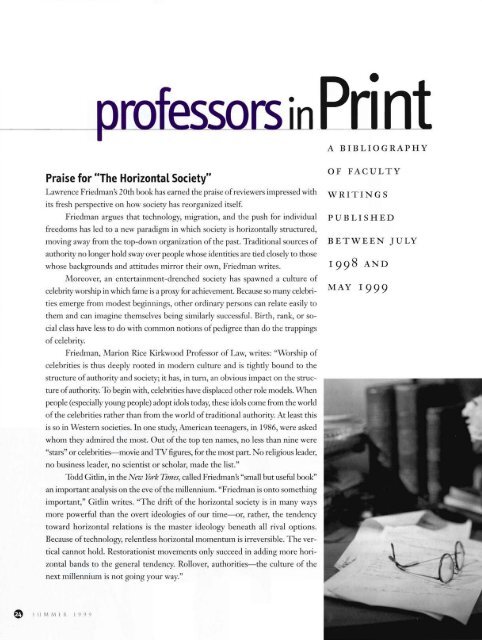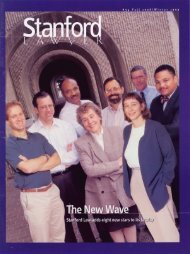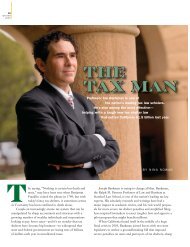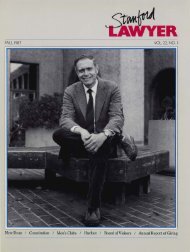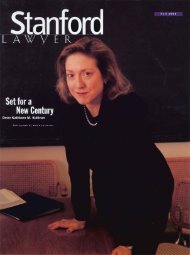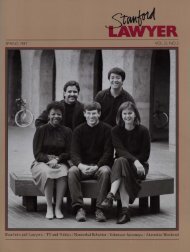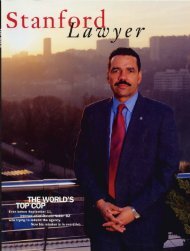A BIBLIOGRAPHYPraise for "The HorizontaL Society"Lawrence Friedman's 20th book has earned the praise ofreviewers impressed withits fresh perspective on how society has reorganized itself.Friedman argues that technology, migration, and the push for individualfreedoms has led to a new paradigm in which society is horizontally structured,moving away from the top-down organization of the past. Traditional sources ofauthOlity no longer hold sway over people whose identities are tied closely to thosewhose backgrounds and attitudes mirror their own, Friedman writes.Moreover, an entertainment-drenched society has spawned a culture ofcelebrity worship in which fame is a proxy for achievement. Because so many celebritiesemerge from modest beginnings, other ordinary persons can relate easily tothem and can imagine themselves being similarly successful. Birth, rank, or socialclass have less to do with common notions of pedigree than do the trappingsof celebrity.Friedman, Marion Rice Kirh.rwood Professor of Law, writes: "Worship ofcelebrities is thus deeply rooted in modern culture and is tighdy bOlmd to thestructure ofauthority and society; it has, in turn, an obvious impact on the structureofauthority. To begin with, celebrities have displaced other role models. Whenpeople (especially young people) adopt idols today, these idols come from the worldof the celebrities rather than from the world oftraditional authority. At least thisis so in Western societies. In one study, American teenagers, in 1986, were askedwhom they admired the most. Out of the top ten names, no less than nine were"stars" or celebrities-movie and TVfigures, for the most part. No religious leader,no business leader, no scientist or scholar, made the list."Todd Gitlin, in the New lork Times, called Friedman's "small but useful book"an important analysis on the eve ofthe millennium. "Friedman is onto somethingimportant," Gitlin writes. "The drift of d1e horizontal society is in many waysmore powerful than the overt ideologies of our time---or, rather, the tendencytoward horizontal relations is d1e master ideology beneath all rival options.Because oftechnology, relentless horizontal momentum is irreversible. The verticalcannot hold. Restorationist movements only succeed in adding more horizontalbands to the general tendency. Rollover, aud10rities-the culture of thenext millennium is not going your way."OF FACULTYWRITINGSPUBLISHEDBETWEEN JULYMAY <strong>1999</strong>~ ,1IMMI·R 199')
f~rlll+\1 , Ll o 0____________~.....,lc....a..... t.....,lo .....n~s------------Lawrence M. Friedman, TheHorizontal Society, New Haven: Yale<strong>University</strong> Press, <strong>1999</strong>,Janet E. Halley, Don't: A Reader'sGuide to the Military's Anti-GayPolicy, Durham, N.C.: Duke<strong>University</strong> Press <strong>1999</strong>.Thomas Heller, Vincenzo Ferrari,and Elena De Tullio, eds.,Citizenship and Immigration:PJ·-oceedings oftbe Conference Held atthe Univel-sity ofMilano, LawFaculty, November 7-9, 1996. 1998.Deborah R. Hensler, et aI., Clm:rAction Dilemmas: PmTuing PublicGoals fiJr PJ-ivate Gain, SantaMonica, Calif.: Rand Corporation,<strong>1999</strong>.]. MyronJacobstein, Roy M.Mersky, and Donald]. Dunn, TbeFUlldmnentals ofLegal Research, 7thed. Westbury, N.Y.: FoundationPress, 1998.]. MyronJacobstein and Roy M.Mersky, ]my Size: Articles andBibliography from tbe Literatlwe ofLaw and the Social and BehaviomlSciences, Littleton, Colo.: Rothman& Co., 1998.Kathleen M. Sullivan and GeraldGunther, Fil-st Amendment Law,Westbury, N.Y.: Foundation Press,<strong>1999</strong>.IULO_JCCJU.LT ERSJoseph Bankman and Ronald].Gilson, "Why Start-ups?," inCorporate Gove17lance Today. NewYork: Columbia Law School, 1998.R. Richard Banks and Jennifer L.Eberhardt, "Social PsychologicalProcesses and the Legal Bases ofRacial Categorization," inConfi'01zting Racism: The Problem andthe ReJPonse. Jennifer L. Eberhardtand Susan T Fiske, eds. ThousandOaks, Calif.: Sage Publications,1998.John H. Barton, "IntellectualProperty Rights and Innovation,"in Capital fiJl' Our Time: TheEconomic, Legal and ManagementChallenges ofIntellecwal Capital.icholas Imparato, ed. <strong>Stanford</strong>,Calif.: Hoover Institution Press,<strong>1999</strong>.Bem.ard S. Black, "ShareholderActivism and CorporateGovernance in the United States,"in The New Palgrave Dictionary ofEconomics and the Law. PeterNewman, ed. New York: StocktonPress, 1998.Bem.ard S. Black and SanjaiBhagat, "Independent Directors,"in The New Palgrave Dictionmy ofEconomics and the Law. PeterNewman, ed. New York: StocktonPress, 1998.Bem.ard S. Black and SanjaiBhagat, "The RelationshipBetween Board Composition andFirm Performance," in ComparativeC01p01'flte Govez71ance: The State ofthe Art and Emerging Reseanh, Kaus]. Hopt, Hideki Kanda, Mark].Roe, Eddy Wymeersch, and StefanPrigge, eds. Oxford: ClarendonPress, 1998.John]. Donohue ill,"Discrimination in Employment,"in The New Palgrave Dictionmy ofEcono'mics and the Law. PeterNewman, ed. New York: StocktonPress, 1998.JohnJ. Donohue ill, "The LegalResponse to Discrimination: DoesLaw Matter?," in HIlW Does LawMatter? Bryant G. Garth andAustin Sarat, eds. Evanston, Ill.:Northwestern <strong>University</strong> Press,1998.Lawrence M. Friedman,"Blankenburg on Legal Culture:Some Comments," in Soziologie desRechts: Festschrift fiil' EThm-dBlankenb1l1"g ZIl1I1 60. Geburtstag.J urgen Brand and Dieter Stempel,eds. Baden-Baden: NomosVerlagsgesellschaft, 1998.Lawrence M. Friedman,"Ethnicity and Citizenship," inCitizenship and Immigration:hoceedings oftbe COllference Held atthe Univenity ofMilrmo, LawFaCIlity, November 7-9, I996.Thomas Heller, Vincenzo Ferrari,and Elena De Tullio, eds. 1998.Lawrence M. Friedman, "SomeThoughts on the Rule ofLaw,Legal Culture, and Modernity inComparative Perspective," inTllWfI1'd Cwzpm'ative Law in the 21stCentll1y. Tokyo: Chuo <strong>University</strong>Press, 1998.Ronald J. Gilson, "<strong>Lawyer</strong>s asTransaction Cost Engineers," inThe New Palgrave Dictionmy ofEt:onomics and the Law. PeterNewman, ed. New York: StocktonPress, 1998.RonaldJ. Gilson and Bem.ard S.Black, "Venture Capital and theStructure of Capital Markets," inC01porote Govemallce Today. NewYork: Columbia Law School, 1998.Henry T. Greely, "InformedConsent, Stored Tissue Samples,and the Human Genome DiversityProject: Protecting the Rights ofResearch Participants," in St01-edTisme Samples: Ethical, Legal andPublic Policy Implications. R. Weir,ed. Iowa City, Iowa: <strong>University</strong> ofIowa Press, 1998.Joseph A. Grundfest, "SecuritiesRegulation," in The New PalgraveDictionary ofEC01lOmics and the Law.Peter Newman, ed. New York:Stockton Press, 1998.Deborah R. Hensler, "The RealWorld ofTort Litigation," inEVelyday PTactices and 7i-ouble Cases.A. Sarat et aI., eds. Evanston, Ill.:Northwestern <strong>University</strong> Press,1998.Pamela S. Karlan, "A BiggerPicture," in Reflecting All ofUr: TheCase fiJI' PTop01'tional RepTesentation.Robert Richie and Steven Hill, eds.Boston: Beacon Press, <strong>1999</strong>.Pamela S. Karlan, "The Impact ofthe Voting Rights Act on AfricanAmericans: Second and ThirdGeneration <strong>Issue</strong>s," in Voting Rightsand Redistricting in the United States.Mark E. Rush, ed. Westport,Conn.: Greenwood Press, 1998.Pamela S. Karlan and Daniel R.Orvitz, "Constitutional Farce," inConstituti01wl Stupidities,Constitlltiollal Tragedies. William N.Eskridge, ed. New York: New York<strong>University</strong> Press, 1998.Mark Kelman, "ConsumptionTheory, Production Theory, andIdeology in the Coase Theorem,"in Law alld EC0110mics Anthology.Kenneth G. Dau-Schmidt andThomas S. Ulen, eds. Cincinnati,Ohio: Anderson Publishing, 1998.Mark Kelman, "Legal Economistsand Normative Social Theory," inFoundations ofthe Economic Appl-oachto Law. Avery Wiener Katz, ed.New York: Oxford <strong>University</strong>Press, 1998.John Henry Merryman, "TheCultural Property Dialogue," inLibel' Amico17Lm HectoT Fix-Zamudio.San Jose, Costa Rica: Secretaria dela Corte Interamericana deDerechos Humanos, 1998.A. Mitchell Polinsky, "Lessonsfrom the Theory ofEnforcement,"in Foundations ofthe Eco1UrmicAppToach to Law. Avery WienerKatz, ed. New York: Oxford<strong>University</strong> Press, 1998.A, Mitchell Polinsky, "PublicEnforcement ofLaw," in The NewPalgrave Dictio11fl1Y ofEconolllic'S andthe Law. Peter Newman, ed. NewYork: Stockton Press, 1998.A. Mitchell Polinsky, "PunitiveDamages," in The New PalgraveDictiollfl1Y ofEcollrrmics find the Law.Peter Newman, ed. New York:Stockton Press, 1998.A. Mitchell Polinsky and StevenShavell, "The Optimal Tradeoff betweenthe Probability andMagnitude of Fines," in Foundationsofthe Economic Applwlcb to Law.Avery Wiener Katz, ed. New York:Oxford <strong>University</strong> Press, 1998.MargaretJane Radin,"Intellectual Property andIntellectual Capi.tal: The Role ofNonproprietary Technologies," inCapital fiJI' Our Time: The Economic,Legal and Manage1llent Challenges ofIntellectual Capital. NicholasImparato, ed. <strong>Stanford</strong>, Calif.Hoover Institution Press, <strong>1999</strong>.Deborah L. Rhode, "The 'NoProblem' Problem: FeministChallenges and Cultural Change,"in Fe1IliniJt ]1l1'isp1"lldence, Womenand the Law: C1'itical Emlys, ReseanhAgenda, and Bibliography, by BettyTaylor, Sharon Rush, and Robert].Munro. Littleton, Colo.: Rothman& Co., <strong>1999</strong>.Kenneth E. Scott, "Agency Costsand Corporate Governance," inThe New Palf51'ave Dictionary ofEconomics alld the Law. Peterewman, ed. New York: StocktonPress, 1998.Kenneth E. Scott, "InsiderTrading," in The New PalgraveDictio11my ofEconomics and the Law.Peter Newman, ed. New York:Stockton Press, 1998.Robert Weisberg, "The CriminalLaw Canon," in Can011S ofthe Lmv.Jack Balkin and Sanford Levinson,eds. New Haven: Yale <strong>University</strong>Press, <strong>1999</strong> (forthcoming).O_CCASIONAlPA.PEJlSBem.ard Black, Gainan Avilov,Dominique Carreau, OksanaKozyr, Stilpon Nestor, and SarahReynolds, "General Principles ofCompany Law for TransitionEconomies," in Legal ScholaTShipNetw01'k (http://www.ssrn.com).July 1998.John]. Donohue III, "DidMiranda Diminish PoliceEffectiveness?," <strong>Stanford</strong> LawSchool, John M. Olin Program inLaw and Economics WorkingPaper No. 160 (1998).John]. Donohue ill, "SomeThoughts on Law and Economicsand the Theory of Second Best,"<strong>Stanford</strong> Law School, John M.Continued 011 page 67, I '" N F () R 11 L '" WI V l R ~


